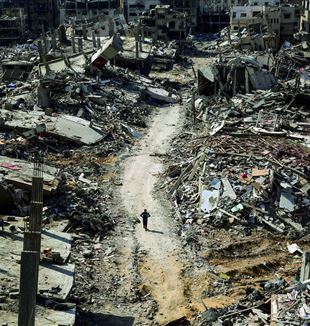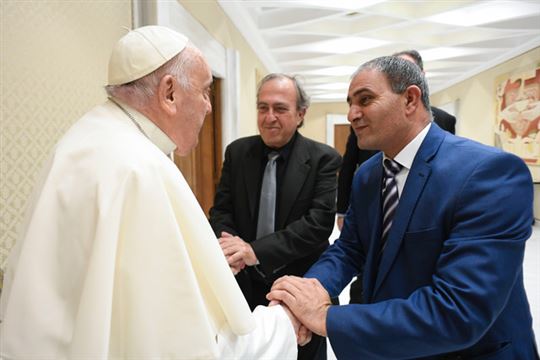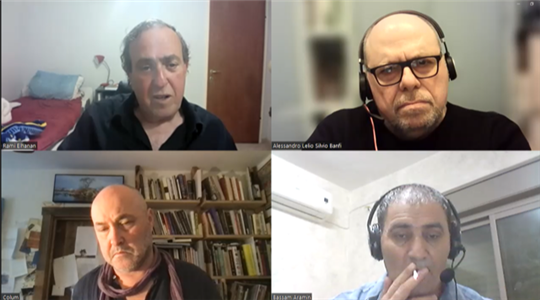
THE POSSIBLE EMBRACE
Two fathers, one Israeli, the other Palestinian, whose daughters were killed in separate incidents in the conflict, reconciled in the Parents' Circle association. We met them along with writer Colum McCann, who wrote the epic book Apeirogon.Ever since I read Apeirogon, the masterpiece by Colum McCann, I have wanted to meet the writer and the two protagonists of the work: the Israeli Rami Elhanan, and the Palestinian Bassam Aramin. A meeting took place thanks to my friends at the Rimini Meeting, where all three will be guests in August, to my colleagues at Tracce, who asked me for this article, and to the head of the Libreria Editrice Vaticana, Lorenzo Fazzini, who brought Rami and Bassam to Pope Francis in Rome on the Wednesday before Holy Week 2024. I recorded more than an hour of our online conversation, between Rome, the United States, Israel, and the West Bank. Here I have transcribed what most impressed and engaged me during our four-way dialogue, full of insights and observations. But let me first briefly introduce my interlocutors.
The writer Colum McCann was born and raised in Dublin, Ireland, and now lives in the US. He is the author of eight novels and three short story collections. Four years ago, after numerous trips to Israel and Palestine, he wrote Apeirogon, dedicated to the relationship between two fathers: one Israeli and the other Palestinian, both marked by grief, who live on opposite sides of Jerusalem. The book's strange title derives from the mathematical term for a polygon with a "countably infinite number of sides", a metaphor for a situation that is very complex to describe and requires viewing from infinite angles.
Rami Elhanan is a Jewish Israeli citizen, living in Jerusalem. His daughter Smadar, was killed at the age of thirteen in a suicide bombing carried out in 1997, on Ben Yehuda street, in the heart of Jewish Jerusalem. During our zoom conversation, when we touched on the subject of his daughter's death, he got up and closed the door so that his wife could not hear our dialogue. So as not to renew the pain, as Virgil would say in his epic verse from the Aeneid, 'Infandum, regina, iubes renovare dolorem.' This comparison is not an overstatement because this is also an epic story. After the attack, Rami decided to join the Parents' Circle Forum, a non-profit organisation that brings together parents of victims from both sides and promotes dialogue and peace.
Bassam Aramin was detained for seven years in an Israeli prison. He joined Rami Elhanan ten years after Smadar's death, when Bassam Aramin's daughter, Abir, was also killed, shot at close range by an Israeli soldier. Since then, the two men have forged an extraordinarily special relationship with each other, a close dialogue that goes against the tide in a tormented part of the world, where hatred and the desire for revenge often dominate.
Let me start with this consideration. The word 'friendship' appears only twice in the book: the first time to describe the relationship Bassam develops with a guard in the Israeli prison. The second in the author's final acknowledgments. But we journalists, hastily, recount that Bassam and Rami became 'friends'....
Rami Elhanan. It was not me who chose Bassam. He chose me, that is why we do not use the word “friends.” We are like two stars who wandered in the universe and then felt attracted by a magnetic force. We met 19 years ago. Why did it happen? The only explanation I can give is: humanity. The brotherhood of humanity. It is a very very rare connection, but it happens. When I say that we are not friends but we are brothers, people are upset, almost shocked....
When I heard you say it, I interpreted it like this: one chooses friendship, whereas brotherhood is objective, a fact that you find you have already been given…
Bassam Aramin. Yes, I agree. Even if you have got problems with him, maybe you have your differences, that is your brother! It is like a family. My initial goal was to find a partner for peace, but then we became more than friends. We are brothers: our relationship is above conflict. I personally believe that Colum grasped this and that is why throughout the book he never used the word 'friendship' for us.
Colum, the reflection I made on the lack of the word friendship is this: Apeirogon is not a 'do-good' novel, as we say in Italy, that is, a positive fairy tale with a happy ending... consolatory. It is a hard, edgy book....
Colum McCann. Friendship is friendship, but it can be lost. Brotherhood, on the other hand, remains, no matter what. It is objective. And so yes, the distinction was necessary. But, you are right, there is another aspect. I did not want to write a sentimental novel. I experienced this risk as a real danger: an Israeli and a Palestinian who are friends and hear each other's violins... ugh, what a consolation... I wanted to make it clear that that was not the point. The focus of my interest was their pain. The extent of their pain. I look at these two men together and I know they love each other. But I know it is about pain. Therefore, nothing stereotypical or sappy. They were brought together by something that should not have happened. And even when I see how others look at them, their fellow citizens, who see them as collaborators or sentimentalists or utopians, well I think, strangely, that they are at war. They are not at war with each other, but they are at war with the people who constantly think that they should be at war with each other, hating each other and not being brothers. It is a deep irony. The peacemakers are at war.
As a father of two daughters, I have tried to imagine your abyss of pain and suffering. Rami, you lost your daughter Smadar in 1997. You said that at first you wanted to avenge her death. Hamas killed your daughter... How is it possible to recover from this unjust death without further violence, as you have shown?
Elhanan. For human beings, the feeling of revenge is very natural. When someone hurts you, you think about retaliating. It has never occurred to me to react with violence. Because I am not a murderer and perhaps because I am the son of a Holocaust survivor, of a man who escaped death in Auschwitz. Anger is bad advice in life and leads nowhere. But yes, Colum is right: the grief is always with me. It is present 24 hours a day, 59 seconds a minute. It is something that is always with me, and if anything, the question is what to do with it? Despite everything, I have tried to use this energy to bring light, warmth and hope.
McCann. It is a very difficult thing to do. Believe me, it is much more difficult than it appears. In terms of writing, it is complicated to write about light and hope, because it is pale ink, white ink... it does not stay on the blank page...
Bassam, your daughter Abir was killed by a rubber bullet fired by an Israeli soldier as she went to buy candy. She died in the same hospital where Smadar was born. You called Rami and joined the Parents' Circle...
Aramin. As Rami and Colum said, it is complicated to explain, but another killing did not give the right answer to my daughter’s death. I am not a murderer. The soldier who shot Abir did not come to kill my daughter because she was my daughter. He does not know why he killed her. He shot by accident, supposedly, not to achieve anything. And then I always think: even if I kill all the Jews left on earth, that will never give Abir her life back. We are in an extreme situation: children are killed every day in Palestine and we are under siege. I have a son who has to pass the Israeli checkpoint in Jericho every day to go to work. Every now and then a Palestinian is killed there. I cannot keep my son at home but when he passes by, and comes home, I thank God. I have five other children besides Abir, and I always hope that one day all this madness will end: the leaders will shake hands and the relatives of the victims will remember their dead. We want to stop this war, this occupation, this oppression, this constant bloodshed, because we love our children.
I read that, since your daughter's funeral, you go to the mosque every morning, an hour before dawn to pray. What is your relationship to your religion?
Aramin. Ever since I can remember, I have been a believer. I try to be a good Muslim. I try to follow religion in every sphere, and, yes, I think that faith has become more important after Abir's death.
Let me also ask you, Rami, what is your relationship to the tradition of your people and to Judaism?
Elhanan. I am not as righteous as Bassam. My relationship is complicated. I was raised by a father who as a young man, until the age of 14, studied in a yeshivà (Jewish schools that focus on the study of the Torah and Talmud) and then, with the impact of the big city, he stopped being religious. When the Gestapo arrested him and deported him to Auschwitz, he told himself that he could not believe in a god who had allowed the death of his loved ones and that horror... At the same time, I grew up respecting our tradition. My mother is from an Orthodox Jewish family. These are my people, my history, and I do not want to turn my back on them. I love my people. That is why it is so painful to see atrocities, to witness murders, to hear these actions justified by Jewish nationality, which for me does not exist.
What do you mean that it does not exist?
Elhanan. To say Jewish and national at the same time is an oxymoron. A Jewish person is by definition of all nationalities. I do not share the ideology in the name of which millions of people are killed and oppressed. To be against this ideology is not anti-Semitism. On the contrary, I claim my deep connection with Judaism, which is not nationalism.
Colum, would you like to add something? As an Irishman, what is your relationship to the Catholic tradition of your people?
McCann. I admire Bassam, what he said is powerful. And I understand very well what Rami is saying. As for my faith, I have to say that I grew up Catholic, but the best answer I can come up with is that it is a mystery. Above all, I grew up in a country that experienced a long civil war. My mother was from Northern Ireland and my father from southern Ireland, and I saw a lot of things. When I was a boy, I remember the Israeli flags of the loyalists and the Palestinian flags of the Catholics....
You write it in Apeirogon, only now am I beginning to understand why you got so involved...
McCann. Yes, there is a brotherhood that unites us in pain. But also in hope. The most powerful message Bassam and Rami carry, and have repeated just now, is that this division, this horror, this pain will end. Last Easter was the 26th anniversary of the peace agreement in Ireland, which ended the war. Who would have imagined, when I was growing up, that this would happen? We were bombing each other, killing each other, there were checkpoints and occupation, and the army and terrorists... Yet, there were some people who even then said: peace is possible. You ask about religion – I think that Rami, Bassam and I share a religion, in the sense of a faith in humanity. A humanity that knows how to recognize these whole continents of pain, for me a Muslim, for me a Jew, for me a Catholic, and knows how to understand each other. Not to love each other, not even to like each other, but to understand each other. And that is a great message.
How exactly did the idea for this book come about?
McCann. I was travelling with Narrative 4 (an international community of students, teachers and writers) looking to understand the conflict. At one point I had this meeting in Beit Jala, ten kilometres south of Jerusalem. It was a rainy November day and I thought: I will listen to these two stories and then go back to the American Colony Hotel and have a beer, life will trip along. But I walked into that room and my life changed. Rami and Bassam told me their story, full of pain and tears. I took notes on a napkin, which I still have. Back in New York, I said to myself: I cannot write this story. I am a white man, an Irishman. I am not Jewish, I am not Muslim. I do not know anything about Israel, I do not know anything about the Palestinians... and yet I love this story. There is something here that the world needs to hear. Rami and Bassam were fantastic: they opened their hearts to me and showed me that if I told even a small part of their story it would work.
Aramin. I just want to add that everything Colum tells is true. And that I know of no greater writer than him.
Elhanan. This book has shown that our daughters can still be alive, present through storytelling.
When you met Pope Francis, did he want to see the photographs of Smadar and Abir?
Aramin. It was a simple but unforgettable moment for us. The Pope was moved, tears came to his eyes. It was a sacred moment when he asked us to pray for him. It was a moment full of compassion and full of love.
Elhanan. He asked us to pray for each other. For the release of the hostages, for peace between Israelis and Palestinians, for a cease-fire. It does not matter which God and which religion but what counts is humanity, brotherhood. Being together.
Aramin. When he spoke about us to all those people at the end of the audience, we felt a wave of solidarity. We sensed that many people of goodwill in the world would like everyone to have the right to live in peace, security and dignity in Israel and Palestine. It seems like an elementary message. To call for peace and coexistence between our peoples, to put an end to hatred and occupation.
It seems incredible that this book was conceived before October 7, when the world became aware of this huge, unresolved problem with the Hamas terrorist attack...
McCann. Three years ago this problem was already huge, as it is even more so now. And it strikes me that after all that has happened in these six months, Rami and Bassam insist on saying what they have always said. The miracle of reconciliation can also happen here, as it did in my Ireland. There may not be forgiveness. Forgiveness is difficult. True peace is always imperfect, it is always a compromise. You have to get a ceasefire, the release of prisoners and hostages, and then end the occupation. That is only the beginning.
Aramin. When I met US Senator John Kerry, former US Secretary of State, I asked him: please invest in peace and not our blood, Jewish blood and Palestinian blood. My daughter Abir, whose picture is now framed in Kerry's study, was killed by an American rubber bullet, fired from an American rifle, by a soldier who got out of an American truck. Americans must stand for our freedom: for Israel to be at peace and for our peoples to live together freely. They must also demand an end to the occupation.
Elhanan. Our enemy is the idea that one people should dominate the other. Destroy the other. Everything else follows. There are infinite technical possibilities. You can have the Temple Mount (the Al-Aqsa mosque) for two hours, I will have the Wailing Wall for another hour. We can find many ways to live side by side and respect each other. I cannot even think of forgiving those who killed my daughter. One cannot forgive the killing of children, of women, of innocent civilians... And it does not matter whether these victims are Jews, Muslims, Christians, Hottentots, or who knows what else. There is something in between hatred and forgiveness, called reconciliation. And it is this middle ground that Bassam and I are fighting for.